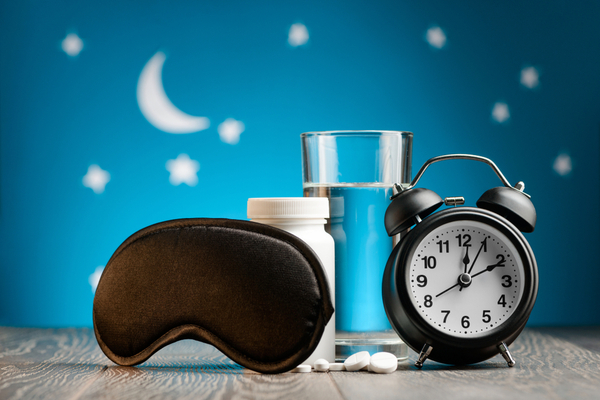Not being able to fall or stay asleep is frustrating, especially if it happens on a regular basis. And with stresses of an election year on top of the Covid-19 pandemic and economic uncertainty, chances are, you’re having more trouble than usual lately. To get much-needed rest, many people turn to the sleep supplement melatonin, which is a synthetic version of the natural melatonin your body makes to help induce sleepiness. But is melatonin safe to take every day? Health magazine reports that this is what sleep experts want you to know about melatonin and whether regular daily use is risky.
What is melatonin, exactly?
Melatonin, aka the “hormone of darkness,” is made by your body in the pineal gland just above the center of the brain. This hormone helps regulate the sleep-wake cycle of your internal clock. “Melatonin gets released when the sun goes down,” Beth Malow, MD, a professor in the department of neurology and pediatrics and director of the sleep disorders division at Vanderbilt University Medical Center, said in an interview with Health magazine. “It makes us drowsy—about two hours after melatonin starts getting released, we are ready to go to sleep.” In the morning when the sun comes up again (or you’re exposed to bright light), melatonin levels fall, cueing your internal clock that it’s time to wake.
What are melatonin supplements?
The brain normally makes only a very small amount of melatonin—around 0.2 milligrams, states Brandon Peters-Mathews, MD, a sleep medicine specialist at Virginia Mason Medical Center in Seattle. For some people, that might not be enough to help them get the rest they need. So melatonin supplements, which typically contain higher doses than the amount your body naturally releases, can be useful to treat sleep disorders and insomnia. “Supplemental melatonin allows us to get drowsy and ready for sleep,” says Dr. Malow. “In addition, melatonin can be calming and help us ‘turn our brains off.”
Research backs this up, showing that melatonin can reduce the time it takes for people with delayed sleep phase wake disorder (DSP) to fall asleep. Another study, published in Journal of Physiology-Paris, found that melatonin might also help reset the body’s sleep-wake cycle. Other small studies suggest that supplementary melatonin can ease anxiety and jet lag.
Melatonin is a prescription medication in Europe, but in the US it qualifies as a dietary supplement, meaning it’s available over the counter without a prescription at drugstores and health-nutrition retail outlets. Not all brands of melatonin are the same, though, and it’s important to read the label and make sure you are getting pure melatonin and not melatonin mixed with other substances, warns Dr. Malow.
Is it safe to take melatonin every day, and are there any side effects?
Both Dr. Peters-Mathews and Dr. Malow believe melatonin is generally safe to take every night, but large studies are needed to determine whether it’s effective and safe for all forms of insomnia and particularly for long-term use. “Melatonin is used safely by most people for years,” says Dr. Peters-Mathews.
Dr. Peters-Mathews recommends sticking to lower doses (1 to 3 milligrams per nightly dose) of melatonin to prevent unwanted side effects, which typically include increased dreaming, nightmares, or morning sleepiness. If you are bothered by these side effects, you should stop taking melatonin and speak to your doctor about alternatives.
Is melatonin considered safe for everyone?
Melatonin isn’t suitable for everyone. You shouldn’t take melatonin at all if you’re pregnant or breastfeeding or have an autoimmune disorder, a seizure disorder, or depression. If you have diabetes or high blood pressure, talk to your doctor before taking it. And if you are on any medications, check with your physician to make sure melatonin won’t make them less effective or cause more side effects.
What if I can’t take melatonin or it doesn’t work or me?
If melatonin isn’t helping with sleep after a week or two of nightly use, Dr. Malow recommends checking in with your doctor about other options. “Also, make sure you are taking a wider behavioral approach, including limiting caffeine after early afternoon, limiting alcohol, and turning screens off at least 30 minutes before bedtime,” she says.
There are many ways to create optimal conditions for a good night’s sleep, whether or not you take melatonin. Keep the lights low before bed to cue your body to relax, and if you watch television in the evening, make sure you’re at least six feet away from the screen, as blue light emitted from the TV can keep you from nodding off. Everyone deserves the snooze time their body requires, and it’s crucial to make necessary changes to your environment and schedule so you can easily drift off to dreamland.
—
Photo Credit: Yuriy Golub / Shutterstock.com
